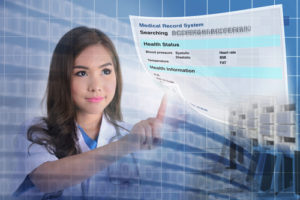 Health informatics is a term that illustrates the acquisition, storage, retrieval, and use of healthcare information. It promotes improved collaboration among healthcare providers and has played a critical role in today’s healthcare reform. What are the types of careers in this field?
Health informatics is a term that illustrates the acquisition, storage, retrieval, and use of healthcare information. It promotes improved collaboration among healthcare providers and has played a critical role in today’s healthcare reform. What are the types of careers in this field?
Informatics in health care
Health informatics is an ever-developing specialized field that combines the use of patient data, computer science applications, and the expertise of health professionals. The combination of the information, technology, and professionals in the healthcare field has created a movement focused on improved safety and higher quality patient care through better management and availability of the information available.
According to the CDC, health informatics is an “interdisciplinary profession that applies mathematics, engineering, information science, and related social sciences (e.g., decision analysis) to important public health problems and processes.” It is not just an interest for the use in public health but every aspect of health care. Health informatics can be found in every hospital, ambulatory facility, clinic, and health-related organization. This field has become an increasingly important part of the management of patient care. So, let’s look at some of the different disciplines within this multidisciplinary academic field.
Public Health – information is a required resource in public health. It serves as the initial step in large-scale assessments of diseases (chronic or infectious). Informatics in areas of public health includes surveillance, reporting, and health promotion. Medical professionals need information as a resource. However, obtaining or interpreting the necessary data can be problematic. Informatics can often function effectively as a source for practitioners by interpreting the data, turning it into useful information, and presenting it in a language that is easily understood.
Clinical– Individuals working in the field of clinical informatics use what they know about patient care along with their understanding of informatics to determine needs of health care professionals and patients. Many times, they play a vital role in changing and developing clinical information systems, provide support for clinicians before and after implementation, and then evaluate the effectiveness of that system in meeting the clinical needs or the organization.
Research– the use of informatics to enable health and biomedical research. This increasingly emphasizes translational research, which looks to speed up the use of research findings from the bench to inpatient settings and ultimately into primary clinical practice.
Imaging– informatics with a focus on imaging. This includes the use of picture archiving and communication systems (PACS) to store and retrieve images in different health care settings. This area of informatics has exploded since the inception of electronic health records (EHR), and the 2015 government mandate that all doctors and hospitals participating in Medicare must use EHRs. In our complex healthcare system, electronic imaging provides clinicians with immediate access to medical images. This is important because it saves valuable time, allows for timely medical decisions, reduces duplication of services, and lowers costs.
Biomedical– often examines and gives support to reasoning, modeling, simulation, experimentation, and translation. People working in biomedical informatics, do this by working with numerous biological systems, connecting scientific and clinical research, medical practice, and healthcare enterprise. These individuals are responsible for designing and implementing novel quantitative and computational methods that can be used to solve challenging issues across the full spectrum of biology and medicine.
Consumer Health– this field is devoted to informatics from the perspective of the consumer. Since the implementation of information systems designed primarily for healthcare professionals, there has been a push to develop systems that can directly reach consumers and patients through computers and mobile devices. This branch of medical informatics analyses the consumers’ needs for information. Individuals do this by studying and implementing methods for making information accessible to all consumers. They frequently look for ways of modeling and integrating consumer preferences into existing medical information systems.
Business– this area of healthcare informatics is more directly related to the systems that are used to gather, house, and protect patient and medical information. Individuals in this field, work across the disciplines of business, technology, and the practice of medicine. Though these professionals work with the healthcare profession, their duties are predominantly IT related.
The careers in health informatics are located at an intersection where healthcare and technology meet. This field is where skills in both the health and computer sciences join to enhance patient and general healthcare outcomes. Professionals in this multidiscipline field can draw on their expertise from both disciplines to put technology to its most significant use for patient care in inpatient and outpatient clinical settings and research.
Tracy Everhart
Master of Science (M.S.), Complementary Alternative Medicine| American College of Healthcare Sciences
Master of Science (M.S.), Nursing| Yale University
Bachelor of Science (B.S.), Microbiology| Hampshire College
October 2019
More Articles of Interest:
